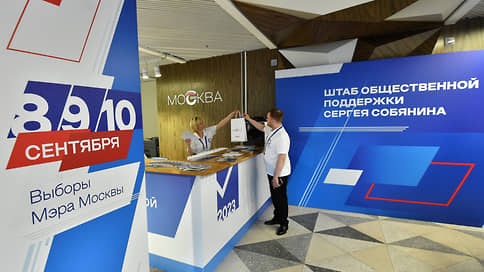The turnout in the Moscow mayoral elections may be a record high
[ad_1]

The rating of Sergei Sobyanin is the highest among voters who prefer online voting, sociologists have found out. According to a Russian Field poll, 82% of the capital’s residents know about the upcoming Moscow mayoral elections in September, and 49% of them are determined to vote for them. The expert warns that on the basis of the declared turnout, it is impossible to make an unambiguous forecast regarding voter turnout, however, apparently, it will exceed past figures.
82% of the polled Muscovites know about the forthcoming mayoral elections in September, only 18% are not aware of them, follows from a survey conducted in Moscow by the Russian Field research group. At the same time, 70% of the respondents are going to take part in the elections (49% of them said that they would definitely go to the elections), 25% are not going to vote.
The Russian Field initiative survey was conducted on August 3-5, 2023 using the street survey method. In the course of the study, 1,000 respondents were interviewed. The sample is quota, representative by sex and age within Moscow and its regions. The maximum size of the error with a probability of 95% does not exceed 3.1%.
Half (50%) of those who intend to vote would prefer to do so in person at a polling station (5% less than at the beginning of May). The share of supporters of remote electronic voting was 44% (increased by 4%). Online voting is the most popular among young people: up to 74% of respondents aged 18-26 are going to use it, while only 22% of them are ready to come to polling stations. The exact opposite picture is observed among those who are already 60 years old: only 20% are going to vote online, 73% want to personally come to the polling stations. The wealthy more often prefer the DEG (50%) than the poor (39%), and those who are satisfied with the situation in Moscow more often (47%) than the dissatisfied (31%).
Among all the candidates, the current mayor Sergei Sobyanin is in the lead – among the respondents who intend to vote, he is preferred by 66%. In second place is Leonid Zyuganov – 5% are ready to support him. The LDPR-nominated Boris Chernyshov won 2%, the SRZP candidate Dmitry Gusev – 1.9%, the New People candidate Vladislav Davankov – 0.09%.
At the same time, the authors of the study note, 33% of Sergei Sobyanin’s voters find it difficult to say for whom they would vote if their candidate was not on the ballot. In this case, 30% of the supporters of the incumbent mayor are completely ready to refuse to participate in the voting, 16% are inclined to support Leonid Zyuganov, and 10% – Boris Chernyshov. Supporters of other politicians are too few in number to be able to judge the flow from them to other candidates, sociologists state.
Mr. Sobyanin’s rating is highest among voters who prefer the DEG – 72.1%, but among supporters of in-person voting, the mayor is gaining 60.6%. For other candidates, the gap in support between these two groups is much lower and amounts to fractions of a percent. It should be noted that Vladislav Davankov’s voters rely on paper ballots: only 0.3% of his supporters choose online voting.
Sociologists also asked respondents which party they would vote for if elections to the State Duma were held next Sunday. United Russia is leading here (42.9%). The second place is shared by the Liberal Democratic Party and the Communist Party of the Russian Federation (8.2% and 7.6%). This is followed by New People (5.5%), SRZP (4.7%) and Yabloko (3.4%).
Political scientist Vladimir Shemyakin is not surprised by the high rating of Sergei Sobyanin, including among DEG supporters. This is logical, because if people are going to vote for the incumbent mayor, they have no reason to fear for the fate of their vote or the possible loss of anonymity, and they can even win through various lotteries, the expert explains. In his opinion, for many Muscovites, Sergei Sobyanin is indeed an uncontested candidate: he is certainly successful as a business executive, and in force majeure situations of recent years (from a pandemic to Yevgeny Prigozhin’s campaign against Moscow) he demonstrated composure and a balanced approach.
Supporters of Sergei Sobyanin are more active on the Internet, since for them the expression of will online is actions within the usual Moscow digital infrastructure, political scientist Alexander Asafov believes. In this ecosystem, they pay utility bills, make an appointment with a doctor, etc. For them, it is more organic, including in terms of expression of will. According to Mr. Asafov, the main intrigue of the current campaign is the fight for second place. All candidates from the opposition parties have their own characteristics, all respond to a particular request. Against the general background, it looks like an anomaly that the Liberal Democratic Party is ahead of the Communist Party, but at the same time, in the individual standings, Mr. Zyuganov Jr. is still in the lead. Sociological measurements often give the Liberal Democratic Party the second place, but they usually have worse mobilization to the polling stations and this affects the results, the expert adds.
As for the declared turnout, it is impossible to determine how it will correlate with the real one, Alexander Asafov warns. However, he adds, taking into account recent legislative changes and the results of recent campaigns of a different level (the turnout in the municipal elections in Moscow in 2017 was 14.8%, and in 2022 – already 33.9%), it can be assumed that voter turnout will noticeably higher than before. And if in the elections of the mayor of Moscow in 2018 the turnout was slightly less than 31%, then in 2023 it can be predicted that it will exceed 50%.
[ad_2]
Source link








